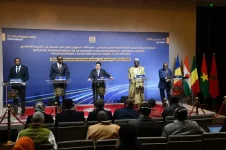Morocco is stepping up as a diplomatic powerhouse across Africa by bringing together six countries facing political transitions. The Republic of Guinea has joined other nations in praising Morocco's strategic approach to managing complex regional challenges.
Foreign Minister Morissanda Kouyaté from Guinea sent an official letter to Morocco's Foreign Minister Nasser Bourita, highlighting the country's innovative diplomatic strategy. Morocco took the lead during its March chairship of the African Union's Peace and Security Council by organizing informal talks with Burkina Faso, Gabol, Mali, Niger, Sudan and Guinea on March 18 in Addis Ababa.
Several African countries have recognized Morocco's leadership as uniquely constructive and realistic. The initiative aims to support nations struggling with political shifts by addressing critical issues like development obstacles, food security, health concerns, counterterrorism efforts, and helping countries restore democratic governmental structures.
Driven by King Mohammed VI's vision of pan-African cooperation, Morocco demonstrates active solidarity with transitioning nations. The country has been working to create regular communication channels that identify specific challenges these countries face during transformation periods and explore collaborative solutions through African Union technical departments and specialized institutions.
Morocco sees itself as a key mediator committed to African progress. By facilitating dialogue and offering support, the kingdom hopes to strengthen cooperation among African states and help them overcome developmental barriers. The diplomatic approach focuses on building a stable, prosperous continent capable of addressing systemic challenges through mutual understanding and strategic partnerships.
These efforts reflect a broader strategy of engagement that goes beyond traditional diplomatic interactions. Morocco wants to help countries reintegrate into continental frameworks by providing practical support and creating meaningful pathways for sustainable political and economic development across Africa.
The initiative represents more than just diplomatic maneuvering. It embodies a deep commitment to pan-African solidarity and a belief that collaborative approaches can transform challenging political landscapes. By bringing countries together and creating supportive environments, Morocco is positioning itself as a critical bridge builder in African geopolitical dynamics.
Foreign Minister Morissanda Kouyaté from Guinea sent an official letter to Morocco's Foreign Minister Nasser Bourita, highlighting the country's innovative diplomatic strategy. Morocco took the lead during its March chairship of the African Union's Peace and Security Council by organizing informal talks with Burkina Faso, Gabol, Mali, Niger, Sudan and Guinea on March 18 in Addis Ababa.
Several African countries have recognized Morocco's leadership as uniquely constructive and realistic. The initiative aims to support nations struggling with political shifts by addressing critical issues like development obstacles, food security, health concerns, counterterrorism efforts, and helping countries restore democratic governmental structures.
Driven by King Mohammed VI's vision of pan-African cooperation, Morocco demonstrates active solidarity with transitioning nations. The country has been working to create regular communication channels that identify specific challenges these countries face during transformation periods and explore collaborative solutions through African Union technical departments and specialized institutions.
Morocco sees itself as a key mediator committed to African progress. By facilitating dialogue and offering support, the kingdom hopes to strengthen cooperation among African states and help them overcome developmental barriers. The diplomatic approach focuses on building a stable, prosperous continent capable of addressing systemic challenges through mutual understanding and strategic partnerships.
These efforts reflect a broader strategy of engagement that goes beyond traditional diplomatic interactions. Morocco wants to help countries reintegrate into continental frameworks by providing practical support and creating meaningful pathways for sustainable political and economic development across Africa.
The initiative represents more than just diplomatic maneuvering. It embodies a deep commitment to pan-African solidarity and a belief that collaborative approaches can transform challenging political landscapes. By bringing countries together and creating supportive environments, Morocco is positioning itself as a critical bridge builder in African geopolitical dynamics.












